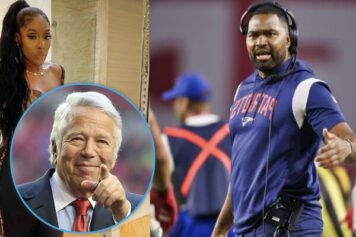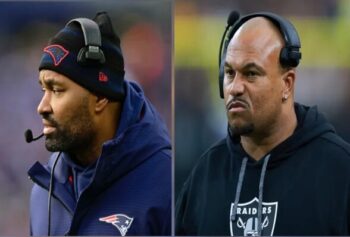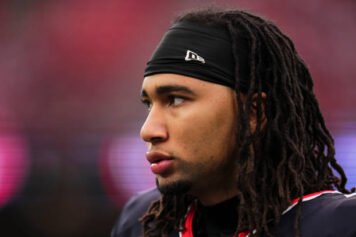A classic moment in American cinema was the scene in Higher Learning, when Omar Epps’ character, Malik, had grown frustrated with the economic advantages his white classmates had over him, as the racial animosity on campus started to build. In a meeting with Professor Phipps, played by Laurence Fishburne, Malik complained that he had so much more to worry about as a young black male whose tuition depended on him running track.
Then there was this brief, but brilliant, back-and-forth between the two:
Phipps: Let us say, for instance, you are running a race, and you suspect the opposing team has a member who is faster, stronger, more big-time than yourself. What do you do then? Do you leave the track?
Malik: Hell no.
*Professor Phipps takes a hit from his pipe*
Phipps: What do you do?
Malik: Run faster.
That’s the moment it seemed to click for Malik, the fact that he’d have to work even harder in life to achieve his goals – similar to running a race against someone who’s faster (or perhaps even given a head start).
And that’s also where the Houston Texans are, even after a 19-13 win in the AFC Wild Card game against the Cincinnati Bengals. Earlier in the season, the Texans were fool’s gold. Picking them to go to the Super Bowl was sexier than Prince’s Dirty Mind album. Now, it’s a team trying to overcome its own condition.
They won the first five games of the season before being baptized in their own stadium by the Packers on Sunday Night Football. From there, Houston rattled off six straight wins until what will always be known in H-Town as the “lettermen jacket game” against the Patriots, if for no other reason than out-of-town jokers constantly reminded us how lame it was.
People believed in the Texans, and at least felt like they were worth paying attention to. That’s why Sports Illustrated NFL writer Don Banks made his first trip to Texans training camp since their inaugural season in 2002.
Before the season, Judy Battista of the New York Times said the Texans had their best chance at a Super Bowl if they stayed healthy and earned home-field advantage.
That’s not exactly what happened, though. Houston dropped three of its last four games, with two opportunities to clinch home-field advantage throughout the playoffs: A home game against the Vikings and a road matchup with a Colts team they’d defeated just two weeks prior.
Couldn’t do it.
The problems that plague the Texans now are the same as the biggest questions on the squad coming into the season. Health is a concern for any team that plays a contact sport as violent as football. Houston faced the cold truth of that point when linebacker and team leader Brian Cushing went down with a torn ACL against the Jets.
But on offense, the Texans have this thing where they can’t really throw the ball downfield to anyone not named Andre Johnson. That’s resulted in some serious predictability in their play-calling, and quarterback Matt Schaub’s last four weeks of football have been an eyesore.
Texans fans don’t really know what to make of this collapse at the end of the season. But Schaub and head coach/play-caller Gary Kubiak are the two elephants in the room. They don’t measure up to the Bill Belichick/Tom Brady dynamic in New England. They aren’t Drew Brees and Sean Payton. Especially after what we’ve seen in these last few weeks, they don’t look like a Super Bowl caliber coach/quarterback tandem, despite Kubiak’s Super Bowl experience and Schaub’s overall success behind center for Houston.
In other words, the Texans have been exposed. They need to run faster. Despite being a 4.5-point favorite at home against the Bengals and winning by six, that was a tough game for the #BullsOnParade, even though it was against an offense that struggled mightily this season and often relied on the defense to carry them.
The Patriots are not the Bengals.
The fans here were losing their minds a week ago. On local Sports Radio 610 AM, all of last Thursday’s focus was on whether the Texans became “complacent” after clinching a playoff spot.
One radio caller even said he could tell the team wasn’t focused by how they behave during the national anthem.
There are still questions as to whether or not Kubiak’s conservative play-calling – that looks to just hold on to a lead and play to live another day instead of going for the jugular against opponents – is the kind that can win a Super Bowl. Schaub looked to be out of his slump against the Bengals, but he didn’t exactly light-it-up in his playoff debut. His pick-six to Leon Hall led to Cincy’s only touchdown of the game.
Houston needs more from its young receivers: Lestar Jean, Keshawn Martin and DeVier Posey.
This is a pass offense that went from fourth in the league through the first nine weeks of the season, to 21st in the last eight weeks. The run offense went from 11th to 24th through the same period. Houston’s coaches and players have to know this.
Like Professor Phipps said in the movie, information is power. If you do not have the information, one cannot seize power. What did you really expect against the Bengals? The question is whether or not they have the power to travel to Foxborough, give the Patriots the business and return the favor from earlier in the season. What do they do?
The answer might be more complex. It might even be deafening, realizing this wasn’t the Super Bowl caliber team they anticipated. But one thing these Texans need to embrace is the analogous “run faster” concept.



